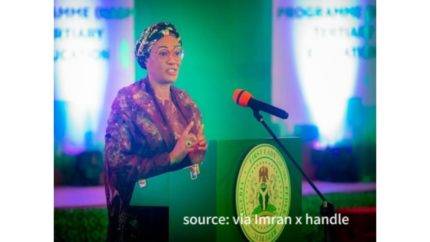The Emir of Kano, during a recent engagement, implored the First Lady to convey the gravity of the situation to the President. Highlighting the escalating severity of the issue, the Emir emphasized that while hunger has been a longstanding challenge, its current magnitude demands urgent governmental attention.
“The hunger and starvation in the land, though didn’t start with this government, but the situation has become worse and needs urgent attention,” remarked the Emir, underscoring the need for swift and decisive action to mitigate the burgeoning crisis. Additionally, he expressed concerns over the government’s response to the escalating insecurity plaguing the nation, urging for more robust measures to address the pervasive threats.
Ongoing Controversy Surrounding CBN and FAAN Relocation Proposal
Amidst the backdrop of mounting speculation and public discourse, the Emir also addressed the contentious issue of relocating the Central Bank of Nigeria (CBN) and Federal Airports Authority of Nigeria (FAAN) to Lagos. Expressing a palpable sense of uncertainty and concern, the Emir called upon the government to provide clarity and transparency regarding the proposed move.
“We are receiving a series of messages from our people. One of such messages is the much-talked-about relocation of CBN and FAAN to Lagos,” stated the Emir, reflecting the widespread confusion and apprehension surrounding the matter. Emphasizing the need for comprehensive public engagement and enlightenment, he underscored the importance of articulating the rationale behind the relocation decision in a manner accessible to all Nigerians.
Calls for Transparent Communication and Public Engagement
In his address, the Emir reiterated the significance of transparent communication and inclusive public engagement in addressing critical national issues. Urging the government to adopt a more consultative approach in decision-making processes, he emphasized the importance of fostering a dialogue that resonates with the concerns and aspirations of the Nigerian populace.
“More enlightenment on this matter is crucial. We should be made to actually understand why the relocation of the CBN and FAAN offices now to Lagos,” asserted the Emir, advocating for clarity and coherence in governmental communication strategies. With calls for decisive action on multiple fronts, including hunger alleviation and infrastructure planning, the Emir’s impassioned appeal underscores the pressing need for proactive governance and effective stakeholder engagement in navigating Nigeria’s multifaceted challenges.
Emphasis on Accountability and Complementary Efforts in Economic Recovery
In the wake of mounting pressure on the federal government to implement economic policies aimed at alleviating the hardship faced by citizens, there is a growing call for accountability and coordinated efforts across all tiers of government. While the focus has predominantly been on federal initiatives, there is a pressing need to extend this scrutiny to local and state authorities. This sentiment underscores the belief that collective action and transparency are imperative in addressing the multifaceted challenges plaguing the nation’s economy.
Accountability Beyond Federal Sphere
As citizens advocate for economic relief measures, there is a parallel push for accountability at the grassroots level. The demand for transparency in resource allocation and project implementation resonates strongly, prompting individuals to engage with local leaders and demand answers. This grassroots movement signifies a shift towards decentralized governance and underscores the importance of holding all levels of government accountable for their actions.
Furthermore, complementing federal efforts requires synergy among governmental bodies at various levels. Local initiatives aimed at job creation, infrastructure development, and social welfare programs can supplement federal policies, leading to a more holistic approach to economic recovery. By fostering collaboration and shared responsibility, communities can leverage their resources more effectively and address the diverse needs of their constituents.
Emir of Kano’s Call for Advocacy and Administrative Matters
In a notable display of leadership, the Emir of Kano has drawn attention to the plight of the people by engaging directly with prominent figures, including the President’s wife. His courageous stance highlights the importance of dialogue and advocacy in effecting meaningful change. By amplifying the voices of the marginalized and holding those in power accountable, leaders like the Emir play a pivotal role in shaping public discourse and driving socio-economic progress.
On the other hand, the recent controversy surrounding the relocation of certain government offices, such as the Central Bank of Nigeria (CBN) and the Federal Airports Authority of Nigeria (FAAN), has sparked debate but may divert attention from more pressing issues. While administrative decisions are integral to governance, the focus on bureaucratic reshuffling risks overshadowing critical concerns such as national security. As the nation grapples with escalating security challenges, diverting attention and resources to peripheral matters could exacerbate existing vulnerabilities and impede efforts to address urgent priorities.
while advocating for economic relief measures remains paramount, it is equally crucial to prioritize accountability, collaboration, and a focus on substantive issues at all levels of government. By fostering transparency, engaging in meaningful dialogue, and directing collective energies towards pressing concerns, Nigeria can navigate its current challenges and build a more resilient and equitable future.
Table of Contents
Discover more from OGM News NG
Subscribe to get the latest posts sent to your email.













